
Presenting a three-way model of feasibility study and effective deployment of knowledge-management using meta-synthesis
Abstract
Knowledge is known as the cornerstone of creating a competitive advantage for organizations. The present study was conducted to provide a three-layer model of feasibility study and effective deployment of knowledge management using meta-synthesis. Meta-synthesis needs the researcher to conduct a thorough and in-depth review and combine the findings of relevant qualitative research. Using meta-synthesis method, 278 articles of knowledge management field were evaluated; using content analysis, dimensions, codes of each were determined; and by means of quantitative Shannon entropy method, the importance and priority of them were determined. According to the findings, it was shown that codes of laws and regulations, holding meetings for combining knowledge, paying attention to the ability to manage crisis in recruiting, commitment to a knowledge program, evaluating and rewarding knowledge, documenting experiences for knowledge extraction, the existence of knowledge software for employee communication (creating a dynamic communication), trust in teamwork, the use of documentation to combine knowledge, and the existence of knowledge reservoirs to store internal knowledge have the highest importance coefficient. Finally, after the research steps, the feasibility and effective deployment of knowledge management was presented in three layers of feasibility, conceptual design and implementation structure and implementation of knowledge management.